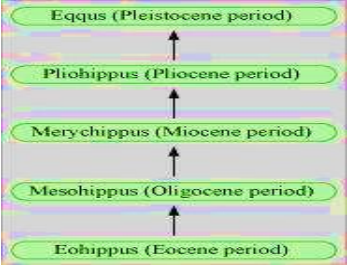10. Using various resources such as your school library or the internet and discussions with your teacher, trace the evolutionary stages of any one animal, say horse.
The evolution of the horse started with Eohippus during the Eocene period. It involved the following evolutionary stages.
A gradual increase in body size
Elongation of head and neck region
Increase in the length of limbs and feet
Gradual reduction of lateral digits
Enlargement of the third functional toe
Strengthening of the back
Development of brain and sensory organs
Increase in the complexity of teeth for feeding on grass
The evolution of the horse is represented as

(i) Eohippus
It had a short head and neck. It had four functional toes and a splint of 1 and 5 on each hind limb and a splint of 1 and 3 in each forelimb. The molars were short crowned that were adapted for grinding the plant diet.
(ii) Mesohippus
It was slightly taller than Eohippus. It had three toes in each foot.
(iii) Merychippus
It had a size of approximately 100 cm. Although it still had three toes in each foot, it could run on one toe. The side toe did not touch the ground. The molars were adapted for chewing the grass.
(iv) Pliohippus
It resembled the modern horse and was around 108 cm tall. It had a single functional toe with a splint of 2nd and 4th in each limb.
(v) Equus
Pliohippus gave rise to Equus or the modern horse with one toe in each foot. They have incisors for cutting grass and molars for grinding food.

© 2026 GoodEd Technologies Pvt. Ltd.